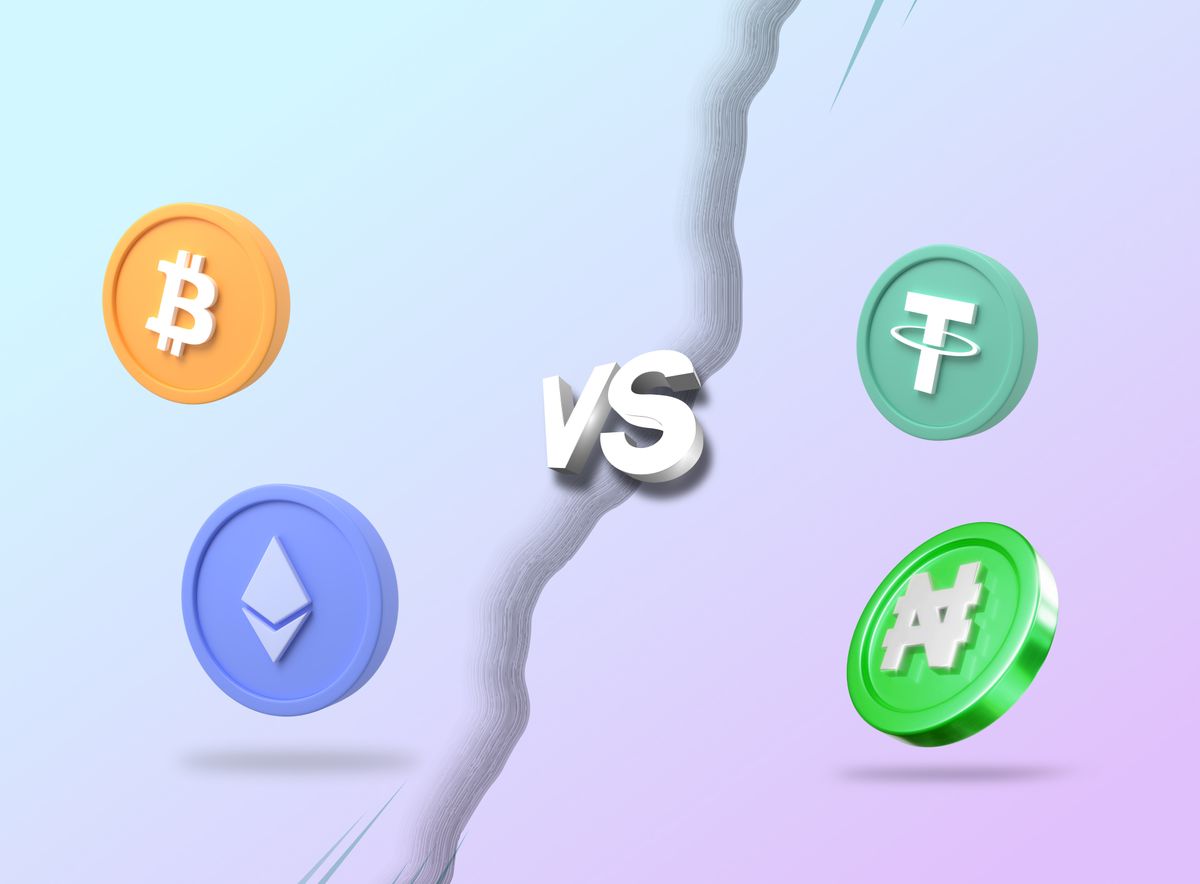Crypto Tokens Vs Crypto Coins - Know The Difference
Crypto tokens and coins may seem similar, but they serve different purposes. Learn the key differences and how each works.

Picture this – you need new accommodation and there are two options before you; buy a house or rent a room or apartment. Whichever choice you make will be dependent on factors such as the amount of money at your disposal, the availability of houses for rent vs. buying and so on.
Bringing this analogy to the crypto world, you can look at crypto tokens as a rented room in a house, and crypto coins as an owned house.
Let’s get further into what are tokens and coins in cryptocurrency, their similarities, differences and uses.
What is a Crypto Coin?
A cryptocurrency coin is a digital coin that runs on its own blockchain.
For instance, Ether is native to and operates on the Ethereum Blockchain and Bitcoin is native to and operates on the Bitcoin Blockchain.
Much like a house is built from the ground up; coins are typically built from scratch to be standalone independent digital assets.
Examples of popular crypto coins include:
- Bitcoin (BTC)
- Ether (ETH)
- Solana (SOL)
- Tron (TRX)
- Litecoin (LTC)
- Monero (XMR)
- Dogecoin (DOGE)
- Stellar (XLM)
What is a Crypto Token?
A cryptocurrency token is a unit of value that doesn’t run on its own blockchain but is rather developed and operated on existing blockchain networks like Ethereum.
Some of the commonly traded tokens running on Ethereum include Tether USDT and DAI.
Relating the concept of token to our house analogy, we could say that a token is a room rented inside a house (crypto coin blockchain).
Just like anyone can rent a room, so can anyone create a token once they know how to write the correct code or use the automated tools available.
Types of Crypto Tokens
Tokens come in different categories to be used for different purposes. Here are the most common types of tokens you’re likely to come across.
Security Tokens
These tokens are digital assets that are minted to represent ownership of an asset like bonds or shares sold by a company to investors to raise funds.
Platform Tokens
Platform tokens are created to support decentralized applications (daps) on the blockchain.
They benefit from whatever blockchain they are built upon while increasing security and sustaining transactional activities. They can be used to support digital collectibles platforms, digital advertising and even gaming platforms.
Dai is an example of a platform token and it is built on the Ethereum Blockchain.
Non-fungible Tokens (NFTs)
These tokens have grown in popularity in the past couple of years. Basically, they are digital collectibles and users can make an NFT out of nearly anything including art, event tickets and virtual real estate.
Read more about NFTs here.
Transactional Tokens
Also known as Stablecoins or tokenized money, these tokens are digital versions of fiat currency and are pegged to the value of that given currency. They can be traded and exchanged for the same value as well.
Examples of stablecoins or platform currencies include Tether (USDT), and USD Coin (USDC).
The Difference between Tokens and Coins
Tokens and coins share fundamental similarities. They both hold value and can be used to make payments. They can even be swapped for each other. For instance, you can swap BTC for USDT and USDT for BTC.
However, they also share fundamental differences:
| Aspect | Coins | Tokens |
|---|---|---|
| Definition | Digital currencies operating independently on their own blockchains | Built on existing blockchains like Ethereum or Binance Smart Chain |
| Examples | Bitcoin (BTC), Litecoin (LTC), Ethereum (ETH) | Chainlink (LINK), Uniswap (UNI), Binance Coin (BNB) |
| Functionality | Typically serve as a medium of exchange or store of value | Created through smart contracts; represent assets, utilities, or services |
| Creation | Mined or validated through consensus mechanisms | Created through smart contracts |
| Use Cases | Used for transactions, remittances, investment | Represent assets (real estate, shares), utilities, governance, or services |
Crypto Coins:
- Coins are digital currencies that operate independently on their own blockchain networks. Examples include Bitcoin (BTC), Litecoin (LTC), and Ethereum (ETH).
- Coins typically serve as a medium of exchange or store of value.
- They are often used for transactions, remittances, and as a form of investment.
Crypto Tokens:
- Tokens are built on existing blockchains, such as Ethereum or Binance Smart Chain. Examples of tokens are ERC-20 tokens like Chainlink (LINK) and Uniswap (UNI), as well as BEP-20 tokens like Binance Coin (BNB).
- Tokens are created through smart contracts and are often used to represent assets or utilities.
- Tokens can represent various assets such as real estate, company shares, or commodities, and can also be used for specific purposes like governance, staking, or access to services within decentralised applications (DApps).
FAQS
Q: What is the difference between crypto tokens and crypto coins?
A: Crypto coins like Bitcoin and Ethereum operate independently on their own blockchain networks, serving as digital currencies. Conversely, crypto tokens are built on existing blockchain platforms and represent assets or utilities.
Q: How are crypto coins created?
A: Crypto coins are typically created through a process called mining, where powerful computers solve complex mathematical problems to validate transactions and create new coins as a reward.
Q: How are crypto tokens created?
A: Crypto tokens are created through smart contracts on existing blockchain platforms like Ethereum. Developers can create tokens with specific functionalities and distribute them as they see fit.
Q: What are some examples of crypto coins?
A: Bitcoin (BTC) and Ethereum (ETH) are the most well-known examples of crypto coins.
Q: What are some examples of crypto tokens?
A: Examples of crypto tokens include ERC-20 tokens like Chainlink (LINK), Uniswap (UNI), and Tether (USDT).
Q: What is the purpose of crypto coins?
A: Crypto coins primarily serve as digital currencies for transactions and store of value, aiming to provide an alternative to traditional fiat currencies.
Q: What is the purpose of crypto tokens?
A: Crypto tokens can have various purposes, including representing ownership of assets (such as real estate or artwork), providing access to a platform or service (such as decentralized finance protocols), or facilitating governance within a blockchain network.
Q: Are crypto tokens and coins interchangeable?
A: No, crypto tokens and coins are not interchangeable. While both are digital assets, they serve different purposes and operate on different underlying technologies.
Q: Which is more valuable, crypto tokens, or coins?
A: There's no straightforward answer to this question as the value of both crypto tokens and coins can fluctuate based on market demand, adoption, and other factors.
Q: Can I convert crypto tokens into crypto coins?
A: You can exchange/swap crypto tokens for crypto coins (and vice versa)on cryptocurrency exchanges, but it depends on the specific tokens and coins involved and the availability of trading pairs. On Obiex, you can swap over 15 different tokens and coins. Get started here.
Disclaimer: This article was written to provide guidance and understanding. It is not an exhaustive article and should not be taken as financial advice. Obiex will not be held liable for your investment decisions.

